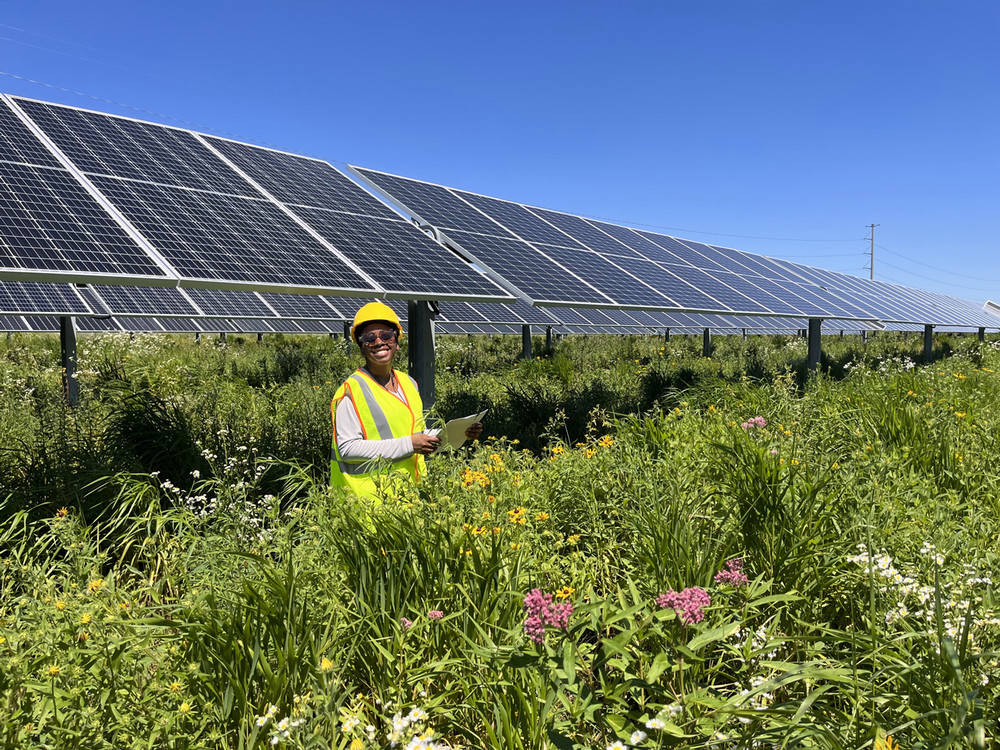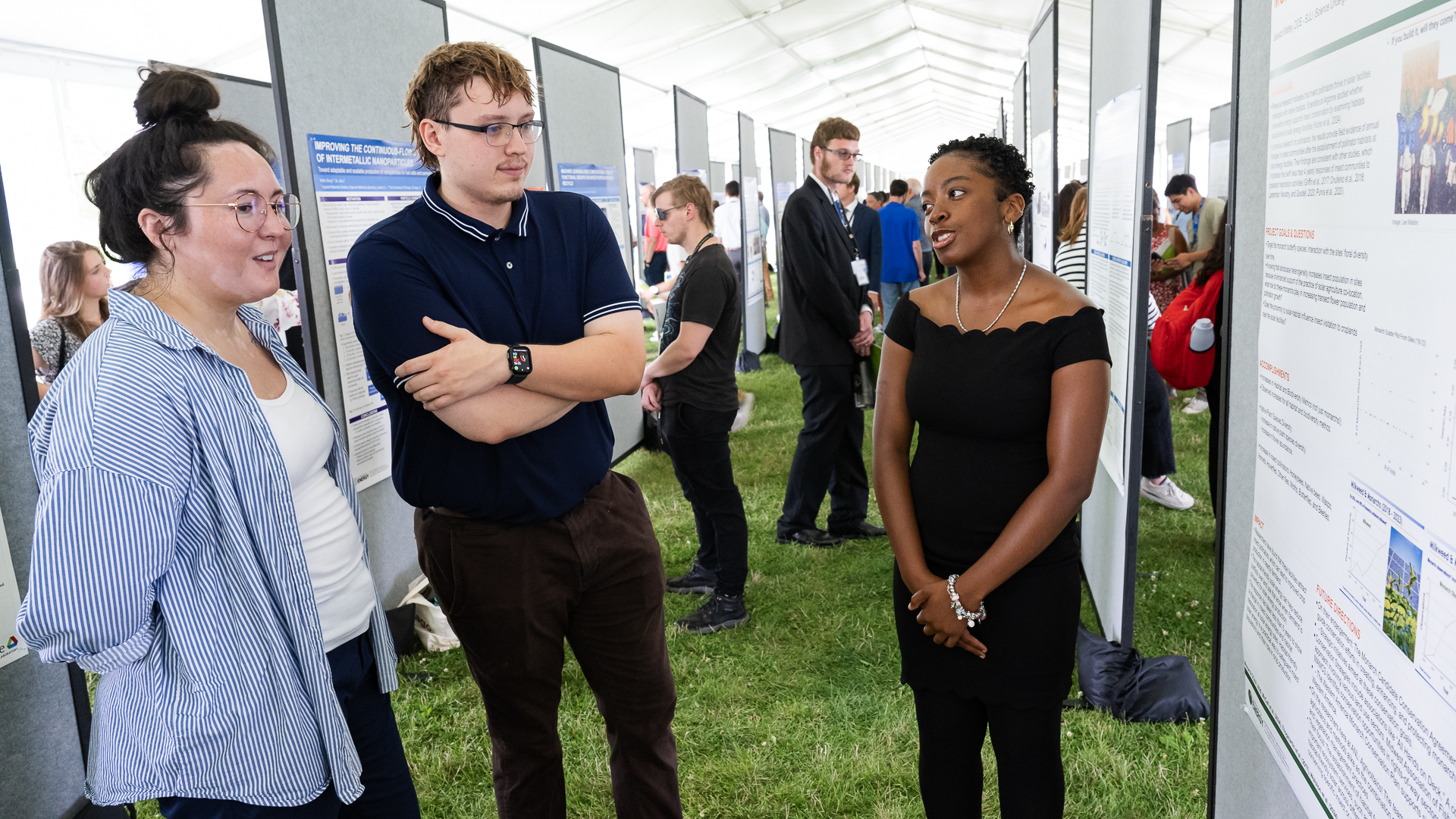Jessica Watley is a sophomore from Detroit dual majoring in environmental sciences and management in Lyman Briggs College and arts and humanities in the Residential College in the Arts and Humanities at Michigan State University. Following her summer 2024 internship at Argonne National Laboratory, Watley was recruited to serve as an official STEM Ambassador for Argonne.
I never thought this was possible, but Argonne National Laboratory — the oldest and most visionary of the country’s national science labs — changed my life when I interned there this summer.
When I first learned about Argonne National Laboratory, or ANL, in Oct. 2023 on a visit for prospective interns, I started dreaming of interning there. Seven months later, that dream turned into reality. At the end of May, I packed my bags and took Amtrak from my home in Detroit to “Chicagoland” to begin my new adventure.
Immediately, one of the things I liked most about Argonne was that most of the current staff and researchers were in our position before — interning to be researchers, operations coordinators, and several kinds of technical programming personnel that help keep the lab afloat.
During the first day of orientation for my Student Undergraduate Laboratory Internship, or SULI, the most frequently asked question was, “What are you most nervous about during your time here?” All of the staff knew we would be nervous.
Pretty much everyone responded to the question in the same way: "I’m worried I don’t have what it takes to succeed here."
I can speak for most of my peers, who felt that anxiety lifted on the first official day. At Argonne, interns gain valuable professional experience guided by the five core values of impact, safety, respect, integrity and teamwork. These values are not just buzzwords at Argonne; they are integral to ensuring that students pursuing STEM careers feel accepted for their research interests. Argonne's implementation of this value system ensures that this unconditional acceptance is upheld.
As a young girl, I was uncertain about my future. While family members would encourage me with familiar words, saying, “You can be anything you set your mind to! Become a doctor, a lawyer, a nurse, even a politician,” none of those paths resonated with me. They felt distant from who I truly was as if I hadn’t yet discovered the spark that would define my life’s direction. “What was my purpose?” I wondered so often.
Then, when I was 15, the world changed. The 2020 pandemic not only brought personal reflection but had showed me the stark reality of our environment’s decline. The wildfires destroying California and Australia, pollution invading my hometown like never before—it was as if the Earth itself was crying out for saviors. It became clear to me that something had to change, and more importantly, that people — ordinary people — had to be the ones to bring that change.
In that moment of revelation, I felt something indescribable. It was as though my mind had awakened, the gears of my thoughts finally clicking into place. For the first time, I understood what passion truly meant. I realized that I was destined not simply to observe the world’s problems, but to take action. To be someone who made a tangible difference. That realization became the compass that guides me today, pushing me toward a future where I can contribute to solutions, answer questions, and, hopefully, inspire others to do the same.
Argonne appointed me to conduct research in ecology, which I had prioritized in my application. My project, “What effects do solar farms have on monarch butterfly populations?”, was part of a larger study exploring “If you build it, will they come?”, which looks into creating sustainable insect habitats in the Midwest. Done mostly in the field, this research examines how solar farms impact monarch butterflies, focusing on habitat changes, land use alterations, and disruptions to migratory patterns.
My study investigated the effects of solar infrastructure on milkweed availability, the primary host plant for monarchs. My research findings suggest a complex relationship, where solar farms can provide new habitats while introducing risks like habitat fragmentation. Understanding these dynamics is essential for developing sustainable energy practices and promoting coexistence with renewable energy infrastructure. The research emphasizes variations in insect populations within solar-pollinator habitat areas, highlighting shifts in dominant insect groups over time.
For example, research on pollinator habitats and populations related to solar farming, which began at Argonne in 2018, revealed a significant finding Sites with milkweed experienced the largest increase in butterfly populations — up to an 80 percent increase in activity! It turns out that when the right resources are available, the butterflies will naturally return and thrive.
By the end of my 10-week journey (which seemed to have passed at the speed of light), I presented my research at Learning on the Lawn, the seasonal symposium Argonne holds for all interns. I was not only fulfilled professionally because people were interested in my research but I was blown away personally by how my life’s path was changed holistically during my time there.
Going into Argonne, I was afraid I would not be accepted for who I was. As a Black, queer woman, being in any space isn’t always easy. But surprisingly to me, I wasn’t the only one, and I was accepted and embraced by those of entirely different backgrounds. I can’t stress enough how important that is as the foundation of a healthy work environment.
Argonne welcomes all with open arms and I am grateful to have found a place where I could truly be myself. The community is filled with supportive, kind, and driven individuals who made my work and social interactions incredibly rewarding. I had an amazing summer and learned valuable skills that I can apply not only now while I am an undergraduate, but in professional settings and my everyday life.
Argonne inspired me to strive for excellence. The success I experienced resulted in transformative personal and professional growth. Since returning home, I tell people that Argonne has been instrumental in helping me discover myself and build a strong foundation for my career. It has helped me gain confidence and assert myself. At Argonne, I wasn't just a student, but a professional.
When it comes to long-term career goals, I have developed a strong passion for the mission of our national laboratories, and I am particularly interested in pursuing a career at Argonne or another national lab, focusing on environmental and marine biological sciences.
I just can’t shake it: The experience and opportunities offered by Argonne have catalyzed making my dreams not only real but attainable.
If you're considering joining the U.S. Department of Energy's Argonne National Laboratory, Watley advises not to worry about fitting in or feeling inadequate. If this piqued your interest, contact Watley or find out more about the programs.
This story originally appeared on the RCAH website.

